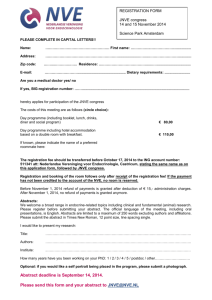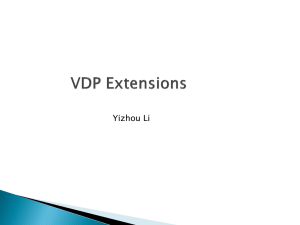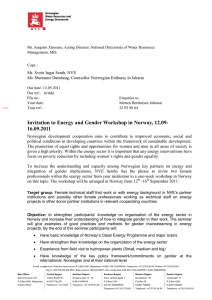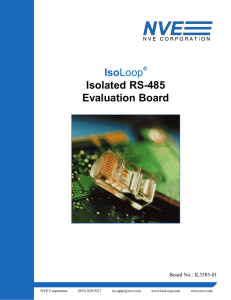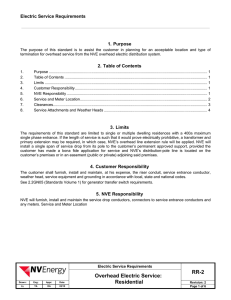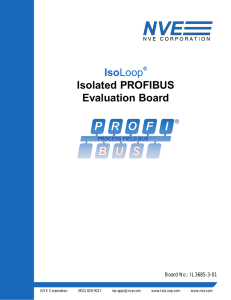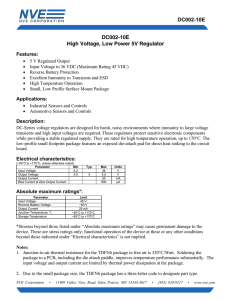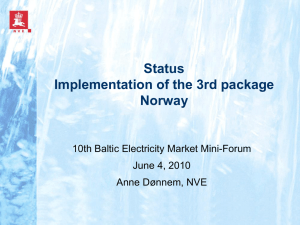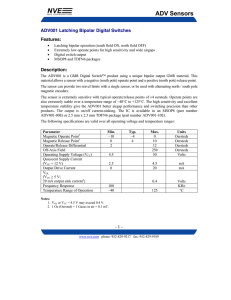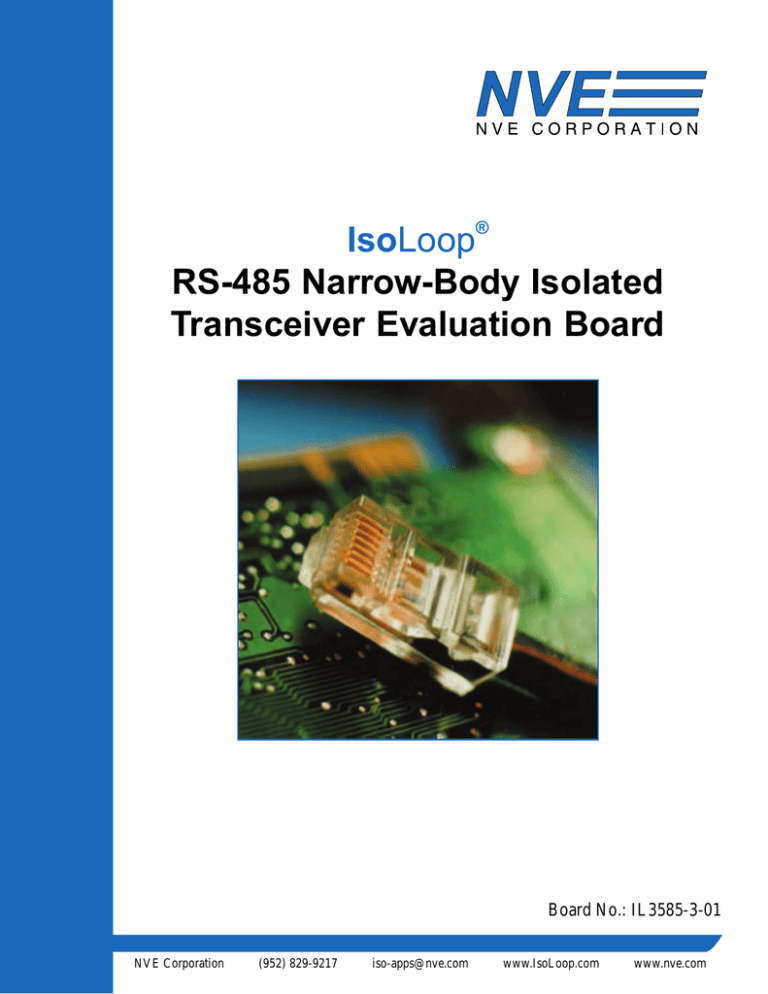
®
IsoLoop
RS-485 Narrow-Body Isolated
Transceiver Evaluation Board
Board No.: IL3585-3-01
NVE Corporation
(952) 829-9217
iso-apps@nve.com
www.IsoLoop.com
www.nve.com
About This Evaluation Board
Isolation reduces noise, eliminates ground loops, and improves safety.
The RS-485 Evaluation Board provides a complete isolated RS-485 node using the
ultraminiature IL3585-3E narrow-body isolated transceiver.
The evaluation board provides screw terminal and RJ45 connections, and demonstrates best
layout practices including separate ground planes.
Termination, pull-up, and pull-down resistors can be changed to accommodate different
fanouts and termination methods.
IL3585 transceivers deliver an exceptional 2.3 V differential output into a 54 Ω load and data
rates to 40 Mbps. The device is also compatible with 3.3 V input supplies for interface to
standard microcontrollers without additional level shifting.
IL3585-3E Specification Highlights
• 40 Mbps data rate
• 16-pin narrow-body (0.15-inch) SOIC package
• 3 V to 5.5 V power supplies
• 20 ns propagation delay
• 5 ns pulse skew
• 100 ps jitter
• Low quiescent supply current
• 2,500 VRMS isolation (1 minute)
• 20 kV/μs transient immunity
• 15 kV bus ESD protection
• Low EMC footprint
• Thermal shutdown protection
• −40°C to +85°C temperature range
• Meets or exceeds ANSI RS-485 and ISO 8482:1987(E)
• UL 1577 recognized and IEC 61010-2001 approved
Visit www.IsoLoop.com for datasheets and illustrative applications.
NVE Corporation
(952) 829-9217
iso-apps@nve.com
www.IsoLoop.com
www.nve.com
Evaluation Board Layout
47 nF decoupling
capacitors close to
VDD1 and VDD2 pins
VDD2 also decoupled
with 10 µF tantalum cap
Bus
connections
Shielded
RJ45 bus
connector
Input
connections
IL3585-3E narrow-body
isolated RS-485 transceiver
Termination resistor
minimizes reflections
Shield grounded
through an RC
network
Fail-safe resistors ensure
known bus state with no
active drivers
Quick Start
• Connect VDD1 to a 3.3 V power supply and VDD2 to a 5 V supply.
• Tie “DE” high and “RE” low to enable the input and output data.
• Connect a signal generator to the “D” input.
• Look for the complementary “A” and “B” outputs on an oscilloscope.
NVE Corporation
(952) 829-9217
iso-apps@nve.com
www.IsoLoop.com
www.nve.com
Circuit Diagram
VDD2
VDD1
CDD1
47nF
1
IL3585-3E
CDD2
47
13 16 nF
6
+ CDD2B
10µF
14
DE
ISODE
10
R FSH
560R
XDE
D 5
RE
11
A
12
B
RT
120R
2
4
5
1,8
RJ45
R
3
2
GND1
Isolation
Boundary
4
15
R FSL
560R
RSHLD
150K
CSHLD
47nF
GND2
IL3585-3E
pin
1
2
3
4
5
6
7
8
9
10
11
12
13
14
15
16
Symbol
VDD1
GND1
R
RE
D
DE
NC
NC
NC
XDE
A
B
VDD2X
ISODE
GND2
VDD2I
NVE Corporation
Description
Input power supply
Input power supply ground return
Output data from bus
Read data enable (R=high impedance if RE is high)
Data input to bus
Drive enable
No internal connection
No internal connection
No internal connection
Transceiver Device Enable (normally connected to pin 14)
Non-inverting bus line
Inverting bus line
Output transceiver power supply (normally connected to pin 16)
Isolated DE output (normally connected to pin 10)
Output power supply ground return
Output power supply (normally connected to pin 13)
(952) 829-9217
iso-apps@nve.com
www.IsoLoop.com
www.nve.com
Cables, Connectors, and Bus Topology
Cable Length
IL3585 transceivers are intended for networks up to 4,000 feet (1,200 m), although the
maximum data rate decreases as cable length increases.
Cables and Connectors
Twisted pair cable helps cancel common mode noise. In noisy environments, use Shielded
Twisted Pair (STP) CAT5 or CAT6 cables and shielded connectors. With shielded cables, one
of the connectors should be tied to earth ground (not digital ground). For demanding
applications, the other connector shield should be connected via an R-C network (typically
47 nF in parallel with 150 kΩ) to earth ground to damp AC noise induced in the shield.
Connector Board Layout Best Practices
Although not always necessary, the following connector layout precautions are best practices:
• The connector, termination resistor, and transceiver should be as close together as possible.
• Two wires from the same differential pair should be adjacent on the connector.
• A differential microstrip on the board reduces reflections if long traces are necessary.
• Use 47 nF decoupling capacitors as close as possible to transceiver VDD pins, plus 10 μF on VDD2.
• Provide ground planes for both power supplies.
Network Topologies and Spurs
Configurations C and D below are examples of ideal configurations where the nodes are in a
continuous line, although not necessarily straight:
D
A
B
C
Configurations A and B have long spurs that can cause reflections. Short spurs from the bus to
intermediate nodes are generally necessary, however. If so, stub lengths should be less than
one-sixth the electrical signal length, which is defined as:
Electrical Length = tr / (Propagation Delay)
For typical values of 10 nanoseconds rise time and 78% propagation velocity, we get an
electrical signal length of 2.3 meters. Thus the maximum stub length is one-sixth of the
electrical length, or 39 cm.
NVE Corporation
(952) 829-9217
iso-apps@nve.com
www.IsoLoop.com
www.nve.com
Biasing and Termination
RFS-EXT
30K
RFS-INT
RT
RT
30K
RFS-INT
RFS-EXT
5V
Inherent Fail-Safe Biasing
“Fail-safe biasing” forces a logic high state
VDD
on “R” in response to an open-circuit
condition between the bus “A” and “B”
A
lines, or when no drivers are active on the
bus. IL3000-Series Isolated Transceivers
B
include internal pull-up and pull-down
resistors of approximately 30 kΩ in the
GND
receiver section (RFS-INT in the figure at
right). These internal resistors ensure failsafe operation if there are no termination
resistors and up to four RS-485 worst-case Unit Loads of 12 kΩ.
Terminate Most Networks
Below 1 Mbps or less than 1,000 feet (300 m), some networks can be unterminated, but
reflections cause errors in faster or longer networks. Reflections are minimized by terminating
both ends of the bus (but not every node). Two 120 Ω termination resistors are generally used
to match a 60 Ω cable impedance.
External Fail-Safe Biasing Resistors
With termination, the differential voltage across the conductor pair will be close to zero with
no active drivers. In this case, the idle bus is indeterminate and susceptible to noise. External
fail-safe biasing resistors (RFS-EXT) at one end of the bus ensure fail-safe operation with a
terminated bus. Biasing should provide at least 200 mV across the conductor pair to meet the
RS-485 input sensitivity specification.
The more loads on the bus, the lower the required values of the biasing resistors. The
evaluation board has a 120 Ω termination resistor and 560 Ω biasing resistors for fail-safe
operation for up to four Unit Loads.
The following table shows other examples:
R FS-EXT
Internal Only
Internal Only
560 Ω
510 Ω
NVE Corporation
RT
None
120 Ω
120 Ω
120 Ω
(952) 829-9217
Loading
Four unit loads (12 kΩ ea.)
Four unit loads (12 kΩ ea.)
Four unit loads (12 kΩ ea.)
32 unit loads (12 kΩ ea.)
iso-apps@nve.com
Nominal V A-B
(inactive)
238 mV
5 mV
254 mV
247 mV
www.IsoLoop.com
www.nve.com
Isolated Network Transceivers
NVE offers a wide choice of isolated RS-422, RS-485, and CAN
network transceivers. Models provide high speed, 15 kV ESD
protection, handshake channels, and fractional loads.
Versions are available in 0.15-inch and 0.3-inch SOIC packages,
making these the most compact solutions in the world while still
meeting safety standard creepage and clearance requirements.
DE
All transceivers have an isolation rating of 2,500 VRMS (one
minute), and are supplied RoHS compliant as standard. All are
UL1577 and IEC61010 approved; the IL3685 is PROFIBUS
compliant.
VCOIL1
D
VCOIL2
A
B
R
RE
IL3122/IL3185/
IL3222/IL3285/
IL3422/IL3485
DE
DE
ISODE
D
Y
Z
D
RE
IN1
OUT1
RE
Bus
RS-422
RS-485
RS-422
RS-485
RS-422
RS-485
RS-422
RS-485
RS-485
RS-422
RS-485
RS-485
NVE Corporation
Inputs
Passive
Passive
Passive
Passive
Passive
Passive
Digital
Digital
Digital
Digital
Digital
Digital
ISODE
R
Mbps
5
5
5
5
20
20
25
35
35
40
40
40
(952) 829-9217
DE
Y
Z
D
A
B
R
RE
IL485W
IL422/IL485
Model
IL3122
IL3185
IL3222
IL3285
IL3422
IL3485
IL422
IL485
IL485W
IL3522
IL3585
IL3685
DE
D
A
B
R
A
B
R
ISODE
Bus ESD
(kV)
15
15
15
15
15
15
15
2
2
15
15
15
Key Features
Low Cost
Low Cost
Fractional Load
Fractional Load
High Speed
High Speed
Industry Standard
Industry Standard
RS-485 + Handshake
Very High Speed
Very High Speed
PROFIBUS Compliant
iso-apps@nve.com
A
B
RE
IL3685
IL3522/IL3585
Nodes
32
32
256
256
32
32
32
32
32
50
50
50
ISODE
Packages
0.15" SOIC-16; 0.3" SOIC-16
0.15" SOIC-16; 0.3" SOIC-16
0.15" SOIC-16; 0.3" SOIC-16
0.15" SOIC-16; 0.3" SOIC-16
0.15" SOIC-16; 0.3" SOIC-16
0.15" SOIC-16; 0.3" SOIC-16
0.3" SOIC-16
0.3" SOIC-16
0.3" SOIC-16
0.3" SOIC-16
0.15" SOIC-16; 0.3" SOIC-16
0.15" SOIC-16; 0.3" SOIC-16
www.IsoLoop.com
www.IsoLoop.com
Limited Warranty and Liability
Information in this document is believed to be accurate and reliable. However, NVE does not give any
representations or warranties, expressed or implied, as to the accuracy or completeness of such information
and shall have no liability for the consequences of use of such information. In no event shall NVE be liable for
any indirect, incidental, punitive, special or consequential damages (including, without limitation, lost profits,
lost savings, business interruption, costs related to the removal or replacement of any products or rework
charges) whether or not such damages are based on tort (including negligence), warranty, breach of contract or
any other legal theory.
Right to Make Changes
NVE reserves the right to make changes to information published in this document including, without
limitation, specifications and product descriptions at any time and without notice.
Use in Life-Critical or Safety-Critical Applications
Unless NVE and a customer explicitly agree otherwise in writing, NVE products are not designed, authorized
or warranted to be suitable for use in life support, life-critical or safety-critical devices or equipment. NVE
accepts no liability for inclusion or use of NVE products in such applications and such inclusion or use is at
the customer's own risk. Should the customer use NVE products for such application whether authorized by
NVE or not, the customer shall indemnify and hold NVE harmless against all claims and damages.
Applications
Applications described in this document are illustrative only. NVE makes no representation or warranty that
such applications will be suitable for the specified use without further testing or modification. Customers are
responsible for the design and operation of their applications and products using NVE products, and NVE
accepts no liability for any assistance with applications or customer product design. It is customer's sole
responsibility to determine whether the NVE product is suitable and fit for the customer's applications and
products planned, as well as for the planned application and use of customer's third party customers. Customers
should provide appropriate design and operating safeguards to minimize the risks associated with their
applications and products. NVE does not accept any liability related to any default, damage, costs or problem
which is based on any weakness or default in the customer's applications or products, or the application or use
by customer's third party customers. The customer is responsible for all necessary testing for the customer's
applications and products using NVE products in order to avoid a default of the applications and the products or
of the application or use by customer's third party customers. NVE accepts no liability in this respect.
An ISO 9001 Certified Company
NVE Corporation
11409 Valley View Road
Eden Prairie, MN 55344-3617
©NVE Corporation
All rights are reserved. Reproduction in whole or in part is prohibited without
the prior written consent of the copyright owner.
Manual No.: ISB-CB-008
December 2012
NVE Corporation
(952) 829-9217
iso-apps@nve.com
www.IsoLoop.com
www.nve.com

